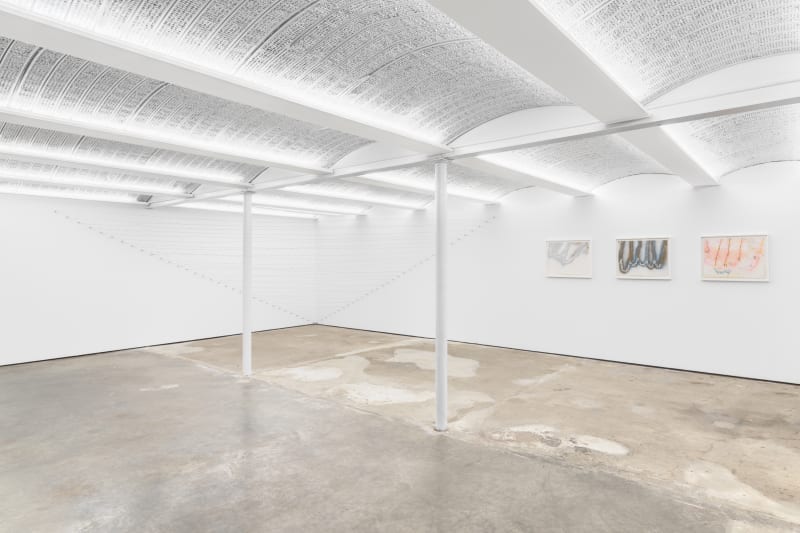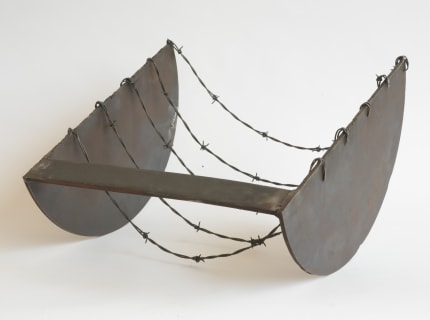Melvin Edwards: B-Wire
Alexander Gray Associates, Germantown presented Melvin Edwards: B-Wire, an exhibition of Here and There (1970/2022), a barbed wire installation, and historic works on paper. The show builds on Dia Beacon’s large-scale installation of Edwards’s previously unrealized barbed wire works—a number of which recently entered Dia’s permanent collection—which opens on May 6, 2022. Foregrounding the artist’s ability to imbue formalism with meaning, Here and There simultaneously references rural life and histories of violence and incarceration.
Barbed wire—“b-wire”—is a particularly evocative material for Edwards. He explains, “[with] barbed wire, you have to be aware that it was a way to keep the cows at home. But then people turned it into concentration camps. Before it happened with Jewish people in World War II, it happened in Namibia. Those contradictions, or contradistinctions are things that have occupied me in visual art. As a way to realize the dynamic in a situation, art or otherwise.” Highlighting these “contradictions,” Here and There imbues the Gallery’s space with an unsettling charge, speaking to Germantown’s identity as a farming community while drawing attention to the past and present racial inequalities of the Hudson Valley.
The Gallery’s show marks the debut of Here and There, whose concept drawing was created in advance of the artist’s 1970 one-person exhibition at the Whitney Museum of American Art. As the first Black sculptor to have a solo show at the museum, Edwards refused to show his sculptures, electing instead to present a series of installations that expanded on the minimalist conceit of “drawing in space” through geometry that dematerialized the modernist grid. With its taut, ribbon-like lengths of barbed wire, Here and There is at once dangerous and delicate. Its evocative linearity—playful yet solemn—is echoed in the artist’s untitled watercolors from the same period, which render silhouettes of foreboding materials in bright colors to belie their sinister uses.
Together, these works give new insight into the artist’s assertion, “I have always understood the brutalist connotations inherent in materials like barbed wire … and my creative thoughts have always anticipated the beauty of utilizing that necessary complexity which arises from the use of these materials in what could be called a straight formalist style.”
Melvin Edwards’s work has been widely exhibited nationally and internationally. This year, Dia Beacon will present a survey of his barbed wire installations. In 2015, the Nasher Sculpture Center in Dallas, TX organized a retrospective, Melvin Edwards: Five Decades. This exhibition traveled to the Zimmerli Museum of Art, Rutgers University, New Brunswick, NJ and to the Columbus Museum of Art, OH. Other recent solo exhibitions include Melvin Edwards: Festivals, Funerals, and New Life, Brown University, Providence, RI (2017); Melvin Edwards: Lynch Fragments, Museu de Arte de São Paulo (MASP), Brazil (2018); Melvin Edwards: Crossroads, Baltimore Museum of Art, MD (2019), traveled to Ogden Museum of Southern Art, New Orleans, LA (2020); and Melvin Edwards: Brighter Days, Public Art Fund, City Hall Park, New York, NY (2021). Edwards’s work has also been featured in innumerable group exhibitions, including Soul of a Nation: Art in the Age of Black Power, Tate Modern, London, United Kingdom (2017), traveled to Crystal Bridges Museum of American Art, Bentonville, AK (2018), Brooklyn Museum, NY (2018), The Broad, Los Angeles, CA (2019), de Young Museum, Fine Arts Museums of San Francisco, CA (2019), and The Museum of Fine Arts, Houston, TX (2020); Postwar: Art Between the Pacific and the Atlantic 1945–1965, Haus der Kunst, Munich, Germany (2016); All the World’s Futures, 56th Venice Biennale, Italy (2015); Witness: Art and Civil Rights in the Sixties, Brooklyn Museum, NY (2014); Blues for Smoke, The Geffen Contemporary at the Museum of Contemporary Art, Los Angeles, CA (2012), traveled to Whitney Museum of American Art, New York, NY (2013); Now Dig This! Art and Black Los Angeles, 1960–1980, MoMA PS1, Queens, NY (2012); and African American Art: Harlem Renaissance, Civil Rights Era, and Beyond, Hammer Museum, Los Angeles, CA (2011), traveled to Smithsonian American Art Museum, Washington, D.C. (2012). Edwards’s work is represented in the collections of the Albright-Knox Art Gallery, Buffalo, NY; Brooklyn Museum of Art, NY; Los Angeles County Museum of Art (LACMA), CA; Metropolitan Museum of Art, New York, NY; Museum of Fine Arts (MFA), Houston, TX; The Museum of Modern Art (MoMA), New York, NY; The National Gallery of Art, Washington, D.C.; Pennsylvania Academy of the Fine Arts (PAFA), Philadelphia, PA; San Francisco Museum of Modern Art (SFMOMA), CA; The Studio Museum in Harlem, New York, NY; and Whitney Museum of American Art, New York, NY, among others. Edwards taught at Rutgers University from 1972 to 2002. In 2014, he received an honorary doctorate from the Massachusetts College of Art, Boston, MA.


